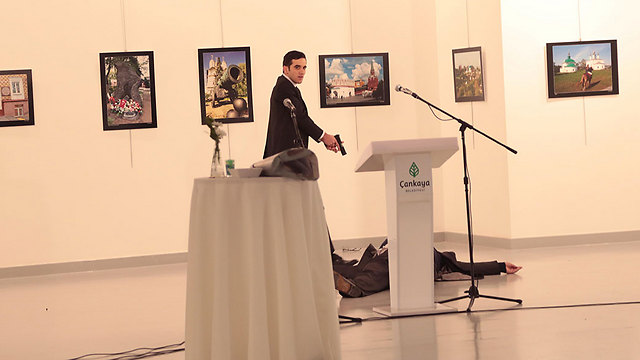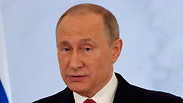Gavrilo Princip was a member of a Serbian terrorist movement called "The Black Hand," which fought against the Austro-Hungarian Empire’s rule. On June 28, 1914, Princip shot the empire’s crown prince, Archduke Franz Ferdinand, and his wife Sophie to death, an act which precipitated World War I.

Will Russia declare war on Turkey over the assassination of its ambassador, Andrey Karlov, in Ankara on Monday? That’s unlikely. All signs, both from the Turkish capital and from Moscow, indicate at the moment that both sides are attempting to minimize the extent of the damage, including holding the talks that are scheduled to take place in the city on Wednesday in a bid to try and find a solution for the Syrian crisis.

The Russian ambassador’s assassination, Monday. The proud Russians understand that Putin’s actions in Syria prompted a person to stand up and take action (Photo: AP)
In fact, there is no need to start a war: It has already broken out a long time ago, and Russia and Turkey are deeply involved in it—from both sides of the barricade. Recep Tayyip Erdogan, the Islamist Turkish tyrant, believed at the beginning of his reign that he would be able to establish an Islamic arc throughout the entire Middle East—which would include Iran, Syria and Egypt—but when the civil war in Syria began, he realized that he must take a stand in the growing rift between the Sunnis and the Shiites. He then jumped in with both feet to stand up against the barbaric massacre carried out by Syrian President Bashar Assad in order to maintain his rule.
Russian President Vladimir Putin, on his part, found a golden opportunity in the civil war in Syria to reassume the position of a world power in our explosive region. He dispatched forces to the region in a cynical game with a double objective. First of all, to physically destroy the moderate and secular forces fighting Assad, so that the only alternative would be the jihad movements, and so the world would make a clear choice in favor of the incumbent president, the lesser of two evils. Second, to make Iran and Hezbollah, which are yearning for Assad’s survival, dependent on the Kremlin.
As time went by, he appeared to be fairly successful. With an investment of relatively cheap military aid and hardly any Russian soldiers killed, he secured Assad’s regime, and is soon helping him complete the murder of Aleppo’s residents while occupying the city. Turkey tried to challenge Russia with words and with an action—downing a Russian plane that invaded its airspace—but Putin’s aggressive response immediately squeezed a crawling apology out of Erdogan.
But like in a good Game of Thrones episode, even the murderous royal family eventually realizes that power has its limits. The Islamic State’s main command managed to shoot down a Russian passenger plane in Sinai in October 2015 with all 224 passengers and crew, in revenge for the Putin's involvement in Syria. The international community took boycott measures against Russia that are burdening its economy. And on Monday, the ambassador was murdered in an act of terrorism that is mainly symbolic (though not for the victim and his family, of course).
In the old KGB world that Putin comes from, such an incident, which bruises the national pride, could be concealed from the citizens at home. In this new world, that is impossible. The proud Russians understand that Putin’s actions in Syria prompted a person to stand up and take action. Putin may be able to intimidate Erdogan and gain a grateful president at the White House, but he can’t take over the entire Mideast population. The more Putin keeps intervening in the region, the more he will learn—like other leaders, like the Israeli plans to change the face of the Middle East when it invaded Lebanon in 1982—that the painful price tag attached to this involvement will continue to grow.


















